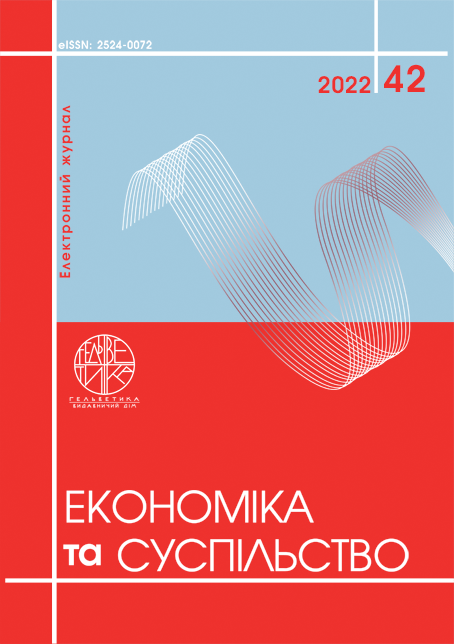GERMANY'S INDUSTRIAL POLICY IN THE TWENTIETH AND TWENTY-FIRST CENTURIES: THE EXPERIENCE OF ECONOMIC BREAKTHROUGH
Abstract
A historical excursion of Germany’s economic “leap” in the context of industrial policy formation is made in the article and it was emphasized that in the post-war period the country was in a very dilapidated state and drastic steps were needed to get out of the difficult situation. L. Erhard’s strategic actions are analyzed in detail and it is said that the primary question was not about the speed of movement, but about the quality of reforms based on the systemic, complex nature of market transformations. The main emphasis was on stimulating the production of goods and services by creating long-term framework conditions for economic development in order to increase the efficiency of the economy. Based on the idea of building a free, efficient and at the same time socially fair market system, the concept of Germany’s social market economy was able to fill the institutional vacuum of the postwar period, gain widespread recognition of German voters and become a fundamental element of Germany’s social and economic system. The dynamics of economic indicators of Germany at the present stage is analyzed. Germany’s economic development in the 21st century is studied separately. It is generalized that the indicators and dynamics of growth of the German economy are the largest in the EU. Analyzing the dynamics of change, it can be noted that in 2019 in terms of GDP, Germany ranked 3rd place, and in terms of purchasing power the 5th place. Economic and mathematical modeling by the method of correlation and regression analysis is carried out in order to determine the impact of the main factors of industrial policy on key indicators of economic growth in Germany. It was found that the country’s GDP growth in the period 1960-2020 years was significantly influenced by exports of goods and services, as well as insurance and financial services, the share of industry in gross domestic product, gross savings. The practical value of the results of the study lies in the possibility of applying to Ukraine the experience of shaping German industrial policy in the postwar period to create a highly competitive and high-tech industrial economy.
References
Видобора В.В. Науково-теоретичні засади промислової політики. Науковий вісник Міжнародного гуманітарного університету. Серія: Економіка і менеджмент. 2020. Випуск 45. С. 35–39.
Історія економіки та економічної думки : підруч. / В.В. Козюк, Л.А. Родіонова, О.В. Длугопольський [та ін.] ; за ред. В.В. Козюка, Л.А. Родіонової. Тернопіль : ТНЕУ, 2015. 792 с.
Quoted by Fabrice Pessin, Christophe Strassel, Le modèle allemand en question. Paris : Economica, 2006.
Fabre А. (2012). The German Economic Model: a strategy for Europe? Fondation Robert schuman. European issues, no. 237.
Мировая экономика: глобальные тенденции за 100 лет / Под ред. И.С. Королева. Москва : Юристъ, 2003. 604 с.
Эрхард Л. Благосостояние для всех. URL: http://www.vixri.ru/d/Erxard%20Ljudvig%20_Blagosostojanie%20dlja%20vsex..pdf (дата звернення: 03.02.2022)
Statistisches Bundesamt. URL: https://www.destatis.de/SiteGlobals/Forms/Suche/EN/Expertensuche_Formular.html?dateOfIssue_dt=older&templateQueryString=gdp++Germany (дата звернення: 03.02.2022)
Страгис Ю.П. История экономики. Москва : «Велби», 2007. 528 с.
Тимошина Т.М. Экономическая история зарубежных стран. Москва : Юстицинформ, 2003.
Морозов В.С. Сучасний механізм регулювання сфери промисловості у ФРН. Вісник Маріупольського державного університету. Серія: Економіка. 2013. Вип. 6. С. 63–70.
The World Bank (2022). Indicators. URL: https://data.worldbank.org/indicator (дата звернення: 03.02.2022)
Vydobora V.V. (2020) Naukovo-teoretychni zasady promyslovoi polityky [Scientific and theoretical fundamentals of industrial policy]. Naukovyi visnyk Mizhnarodnoho humanitarnoho universytetu. Seriia: Ekonomika i menedzhment, no. 45, pp. 35–39. (in Ukrainian)
Koziuk V.V. (Ed.), Rodionova L.A. (Ed.), Dluhopolskyi O.V. et al. (2015). Istoriia ekonomiky ta ekonomichnoi dumky [History of economics and economic thought]. Ternopil: TNEU. (in Ukrainian)
Quoted by Fabrice Pessin, Christophe Strassel (2006). Le modèle allemand en question. Paris: Economica.
Fabre А. (2012). The German Economic Model: a strategy for Europe? Fondation Robert schuman. European issues, no. 237.
Korolev I.S. (Ed.) (2003). Mirovaya ekonomika: global’nye tendentsii za 100 let [The world economy: global trends for 100 years]. Moskva: Yurist, 604 p. (in Russian)
Erkhard L. Blagosostoyanie dlya vsekh [Welfare for all]. Available at: http://www.vixri.ru/d/Erxard%20Ljudvig%20_Blagosostojanie%20dlja%20vsex..pdf (accessed: 03.02.2022) (in Russian)
Statistisches Bundesamt. Available at: https://www.destatis.de/SiteGlobals/Forms/Suche/EN/Expertensuche_Formular.html?dateOfIssue_dt=older&templateQueryString=gdp++Germany (accessed: 03.02.2022)
Stragis Yu.P. (2007). Istoriya ekonomiki [History of Economics]. Moskva: «Velbi». (in Russian)
Timoshina T.M. (2003). Ekonomicheskaya istoriya zarubezhnykh stran [Economic history of foreign countries]. Moskva: Yustitsinform. (in Russian)
Morozov V.S. (2013). Suchasnyi mekhanizm rehuliuvannia sfery promyslovosti u FRN [Modern mechanism for regulating industry in Germany]. Visnyk Mariupolskoho derzhavnoho universytetu. Seriia: Ekonomika, vol. 6, pp. 63–70. (in Ukrainian)
The World Bank (2022). Indicators. Available at: https://data.worldbank.org/indicator (accessed: 03.02.2022) (in Ukrainian)


